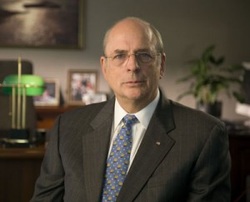 Ever heard the saying, "better to keep silent and be thought a fool, than speak up and remove all doubt?" How many times have we sat through a meeting and thought, "I know the answer to this problem," but keep quiet. Maybe the team thrashes around a bit and ends the call. The problem remains and the opportunity to resolve it has passed. Why are we quiet? Why not speak up? Theorizing, new employees may be intimidated by the largest technical workforce in the industry. Let's face it, the smartest, most innovative engineers work in my industry. This can be daunting and intimidating in itself. Some might think, "What can I tell them, that they don't already know? These are smart people." Employees might be afraid of losing their job. A contrary position or approach to the problem may be viewed as confrontational. Perhaps they think, "what if my idea is not well received?" Sometimes internal colleagues can be our own worst enemy. We shoot down new ideas, disregard concepts as "not invented here", and are often very critical of different approaches. Colleagues may be willing to share these ideas in meetings, but get shot down. Their response might be to cease sharing or speaking up - after all, how many times are we willing to get "shot down" in public settings? Dominant personalities in the business setting will override others, especially if the others do not speak up. As a result of industry reductions in force, cutbacks, and lean management strategies, staffers are increasingly being asked to shoulder more responsibility. That means speaking up and making decisions. We have to be courageous and share what we know or offer solutions. The industry is counting on us. How? At every level, we need to be open to suggestions, ideas, and approaches. One technique we can do is solicit feedback from others in a meeting. Our colleagues may be ready to speak, but cannot find an opportune time to insert themselves into the conversation. As a lead or meeting chair, we might ask quiet attendees for their input. Often, their insight will result in moving the discussion forward. We go to the movies and hear "Silence is Golden." Certainly that is true at times, however in a business setting, our voices need to be heard. It might just be others are talking around a problem, but your voice needs to be heard! More info: Nilofer Merchant has a great post on Speaking Up in the Harvard Business Review
1 Comment
 The LA Times has a story about how business cards are not appealing to digital folks, particularly in Generation Y (people in their 20s and 30s). One so-called expert says, "They absolutely gravitate toward products that help them do things really efficiently. It's time-consuming to organize business cards — and not portable." Really, since when are business cards not portable? Publishers cite decreased sales of business cards. Generation Y doesn't see the point of business cards. I submit there are still reasons to keep business cards in the digital society. Here's a short list of reasons business cards will continue to be used, even in the digital economy:
Despite word processors, digital note takers, digital pens, and other gadgets, paper pads, notebooks, portfolios make an appearance in every high-tech meeting I attend. Besides, those "free lunch" fishbowls are not electronic yet, they still take business cards. Who knows, maybe someday I will win a free lunch drawing.  "Physics, as we know it, will be over in six months." -- Max Born, 1928 "Flight by machines heavier than air is impractical and insignificant, if not utterly impossible." -- Simon Newcomb, Director, U.S. Naval Observatory, 1902 "Aerial flight is one of that class of problems with which man will never be able to cope." -- Simon Newcomb, 1903 "The popular mind often pictures gigantic flying machines speeding across the Atlantic carrying innumerable passengers in a way analogous to our modern steam ships. . . it seems safe to say that such ideas are wholly visionary and even if the machine could get across with one or two passengers the expense would be prohibitive to any but the capitalist who could use his own yacht." -- William Henry Pickering, Astronomer, 1910 "A popular fantasy is to suppose that flying machines could be used to drop dynamite on the enemy in time of war." -- William H. Pickering, Director, Harvard College Observatory, 1908  "Airplanes are interesting toys but of no military value." -- Marechal Ferdinand Foch, Professor of Strategy, Ecole Superieure de Guerre "Landing and moving about on the moon offers so many serious problems for human beings that it may take science another 200 years to lick them." -- Science Digest, 1948 "The aeroplane is the invention of the devil and will never play any part in such a serious business as the defence of a nation." -- Sir Sam Hughes, Canadian Minister of Defence, 1914 ~~ More good quotes on technology that failed: http://zimmer.csufresno.edu/~fringwal/stoopid.lis  “The bottom line is that the things engineers do have consequences, both positive and negative, sometimes unintended, often widespread, and occasionally irreversible." -Norm Augustine Norm Augustine is one of the most innovative leaders in the world. Augustine’s name is not instantly recognizable to most people, but his work has affected millions. After a distinguished career that spans government, private enterprise, and non-profit organizations, Norm Augustine retired in 1997 as CEO of Lockheed Martin, the largest aerospace, defense, systems integration company in the world. Mr. Augustine’s accomplishments are legendary: Under Secretary of the Army, Office of Secretary of Defense (Engineering), Chairman of the American Red Cross, 17 honorary degrees, and president of the Boy Scouts of America. Augustine earned numerous awards, most recently the National Academy of Sciences 2006 Public Welfare Medal which honors his "contributions to the vitality of science in the United States by bringing to industry and government a better understanding of the crucial role that fundamental scientific research must play in our long-term security and economic prosperity." Despite his accomplishments, Augustine knows adversity: “the first rocket he worked on blew up after a flight of 250 milliseconds. The next one was canceled a week before its first flight. Augustine became CEO of a defense contractor, Martin Marietta Corp., just as the Berlin Wall--and Pentagon procurement spending--collapsed” (Crock, 1997). Augustine has seen the highs and lows of engineering projects and business, yet he remains humble and down to earth with a wry sense of humor. Accomplishments Lt Gen Michael M. Dunn, USAF, President, National Defense University introduced Norm Augustine at an awards ceremony noting that three characteristics among Augustine’s numerous accomplishments stand out: Scholarship, Excellence in Industry, and Public Service. Augustine is a scholar having written four books and dozens of articles. Upon retiring from Lockheed Martin he accepted a teaching position at his alma mater Princeton University demonstrating his commitment to STEM education and scholarship. Augustine was only the second person in his family to attend high school, and the first ever to go to college. Augustine explains personal experience fuels his dedication to education, “The chance to get that education made all the difference in the world to me, and I think we owe it to every young person in America to have the opportunity to get a first class education” (Pacesetter, 1997). Dunn describes Augustine as “captain of industry”, leading Lockheed Martin to Mission Success despite shrinking defense budgets and the collapse of the Cold War. In a 1995 interview Augustine discusses the state of the defense industry, “The major firms sell at a 30-percent discount to the S&P 500 index. The combined market value of the top four aerospace firms is less than that of McDonald’s, meaning that Big Macs and Egg McMuffins are judged by the market to have greater immediate reward than stealth aircraft and “smart” weapons.” Augustine notes the 70-percent decline in procurement spending since the mid-1980s and the decline of defense suppliers from 120,000 in 1985 to 30,000 in 1995. To combat the shrinking marketplace, Augustine recognized the need to consolidate and merge with competitors in the defense industry before it collapsed as a result of weaker competitors in the market. He calls this the Law of the Cross-Eyed Discus Thrower: “He may not win any gold medals, but he sure keeps the spectators on their toes.” Augustine revolutionized the defense industry, successfully navigating his organization to the top of the mountain. Lockheed Corporation and Martin Marietta merged and brought IBM Federal Systems, GE Aerospace, Loral Systems, and General Dynamics into the fold to form the greatest technology company ever created. Augustine worked on technology transfer techniques from commercial industry to defense. In the traditional model, defense spending allowed for research and techniques which then could be applied to commercial products and services. As defense budgets shrank, Augustine realized commercial projects rather than defense would take the leadership role in technology innovation. Augustine positioned his organization to work with simulation, commercial satellites, industrial navigation systems, and medical technologies. To date, Lockheed Martin has made successful inroads in the commercial market, namely in large scale systems integration. Keenly aware of global and industrial changes, Augustine says, “there are only two kinds of companies – those that are changing and those that are going out of business” (Augustine, 1997). Finally, Lt Gen Dunn recognizes Augustine’s work as a public servant in government by serving in positions such as the Office of the Secretary of Defense as an Assistant Director of Defense Research and Engineering, Assistant Secretary of the Army, then Under Secretary, and finally Acting Secretary of the Army. Augustine’s other notable public service positions include Chairman of the American Red Cross and Chairman of the Defense Policy Advisory Committee on Trade. Hobbies and Health "I love what I'm doing, and I haven't missed a meal in years," Augustine said in a 1991 Forbes interview. Despite working long hours, Augustine finds time to enjoy his hobbies. Fishing is one; another is building elaborate doll houses. Augustine is a well-traveled adventurer. He has dog-sledded in the Arctic and explored volcanoes in the Antarctic; backpacked in the Canadian and U.S. Rockies; horse-backed in the U.S. Rockies; sailed a tall ship in the West Indies and a stern wheeler up the Mississippi; traveled the Oregon Trail in a covered wagon; snorkeled on the Great Barrier Reef; boated the Amazon; hot-air ballooned in Africa; rafted the Grand Canyon; toured the Out-Back of Australia and the desert of Saudi Arabia; been on camera safari in Tanzania and Kenya; and photographed polar bears in the Northwest Territory. Augustine has been to both North and South poles. Some of his adventures are collected in his book “Augustine's Travels: A World-Class Leader Looks at Life, Business, and What It Takes to Succeed at Both.” Conclusion Norm Augustine fell into the defense industry by accident – a Princeton colleague suggested young Augustine change his major from geological engineering to aerospace engineering. Augustine had a career ambition of being a forest ranger; however he followed the colleague’s advice. Augustine rose to prominence for his insightful leadership, innovative management ideas, and commitment to ethics. Having successfully piloted a defense contractor through some of the worst defense spending reductions in history makes Augustine a legendary leader. Success, Innovation, Integrity – it’s the formula that makes Augustine’s Law. References
This is your new blog post. Click here and start typing, or drag in elements from the top bar.  The Economist has a new story out stating an analysis of linkedin job titles shows that adjunct instructor is the fastest growing job title. The Economist also called adjuncts: "an ill-paid, overworked species of academic." Read more: http://www.insidehighered.com/quicktakes/2012/03/13/linkedin-adjunct-jobs#ixzz1p0VImvDO |
AuthorDirector Archives
January 2023
Categories
All
|
Photos from europeanspaceagency, ▓▒░ TORLEY ░▒▓, Lori_NY, Dean_Groom, dalecruse, Fin Cosplay & Amigurumi, Iain Farrell, erin_everlasting, palindrome6996, Easa Shamih (eEko) | P.h.o.t.o.g.r.a.p.h.y, markhillary, Matt McGee, Marc_Smith, woodleywonderworks, agustilopez, rachel_titiriga, SeaDave, cheri lucas., Caio H. Nunes, grabbingsand, Armchair Aviator, quinn.anya, Jennifer Kumar, billaday, edtechworkshop, chucknado, purpleslog, yugenro, christianeager, dground, GlasgowAmateur, expertinfantry, shixart1985 (CC BY 2.0), OiMax, Wilfried Martens Centre for European Studies, PEO, Assembled Chemical Weapons Alternatives, IBM Research, shixart1985, markus119, shixart1985, shixart1985, Wilfried Martens Centre for European Studies


 RSS Feed
RSS Feed
